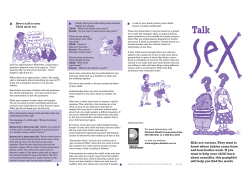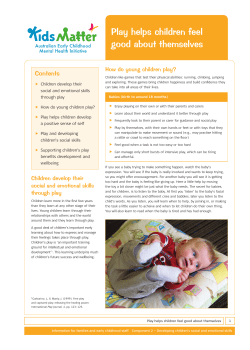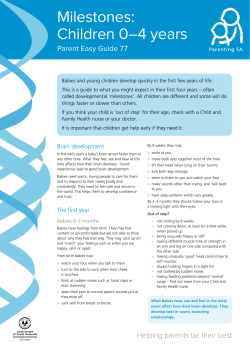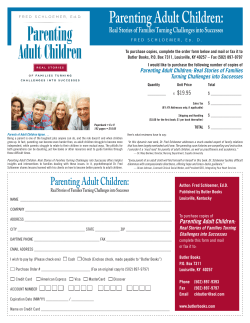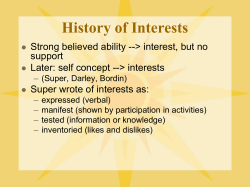
Why stories are important
Why stories are important Parenting SA Parent easy guide 57 Stories help children to cope with many feelings and problems. Story time can be a special caring time with you that your children will remember all their lives. Whether they are the stories you tell, or in books, stories are one of the ways that children learn to enjoy reading. Books and the people they read about in books can become like friends. Children can also learn that books are a way to find out useful and important information. Many people look back with pleasure on their favourite stories from childhood. It is now known that reading aloud to babies and children is so important in their early years and has an impact on their overall development and future learning. This PEG uses ‘he’ and ‘she’ in turn. Change to suit your child’s sex. Note: if you don’t enjoy reading or find it a struggle, you still need to show your children that reading is important. You can have books around the house and you can tell your children that you wish you had had the chance to learn to like reading. Why read with children? >> Our language is the way we communicate with others. It helps us to understand ourselves and to make sense of the world. How books and stories help children >> Reading is something that many of us enjoy and that we all need to be able to do. Every time we go out we are reading signs, labels and directions. >> Books help language and thinking. >> Letting children see you read lots of different things such as letters, cards, recipes and newsletters gives them positive messages about reading. >> Showing simple pictures and then saying the name of what is in the picture helps even very young children to learn what things are called. >> Young children can learn about the world from picture books. >> Children can learn many things from books - about size, colour, shape; about what things look like; and about people and their lives. >> Children who enjoy reading are likely to become confident learners. >> Reading can become a favourite hobby which children go on to enjoy all their lives. >> Reading and/or story time can be special time for both parents and children. If it’s a relaxed and happy time, it helps build good relationships between you and your child. It helps build a sense of security and good self-esteem. >> Stories can help children to deal with the problems and fears that they face in everyday life. >> They learn about numbers and space. For example from ‘The Three Bears’ they can learn that there were three bears, one father bear, one mother bear and one baby bear. They also learn about such things as big and little, inside and outside. All of this happens without any teaching – they learn it just from enjoying the story. >> Stories help to develop children’s imaginations. Helping parents be their best Parent easy guide 57 - Why stories are important Stories help children cope with feelings >> When you read or tell a story which contains feelings your child is helped to accept his feelings and to understand how others feel. He learns that he is not alone and that other children may feel the same as he does. This helps him to know that his feelings are okay. >> You can also learn how your child feels when you see him respond to the feelings in the story. If he really likes a book it may be because it has special meaning for him and is helping him with his feelings. >> When you read a story to your child it can show that you understand how he feels. For example if you are reading a story about another child (or animal) who is frightened of the dark, it helps your child to know that you understand that it is easy to be frightened of the dark when you are very young. >> Books help to deal with fears. Books about something your child fears can help your child to cope with the fears. Hearing or reading the story many times can help children manage their fears. These are the books which you might need to read over and over again if your child wants you to. Stories help develop confidence >> Part of building self-esteem and confidence is knowing where you fit in the world. Stories told by parents and grandparents about family history – ‘when Mummy was a little girl’ – help your child develop this sense of belonging. This is even more important if you have come from another place or your family has been split up. >> Special story time at bedtime can help your child look forward to going to bed, to enjoy being close to you and to relax, ready for sleep. >> Books can help your child to escape for a while from the stresses and pressures of their world. The story takes her imagination to other wonderful places. >> Most importantly your child will thrive on spending time with you. >> Reading and telling stories to your child can become a very special sharing time. It helps your children to learn to love books and to develop a sense of being a lovable person. Many children remember their story times for the rest of their lives. Tips for story tellers >> Whether you read or tell stories to your children you will be helping them in many ways. It is best if you can do some of both. Some of us don’t like telling stories very much, others don’t like reading. Do what works best for you and your child. >> You can get picture books that don’t have any words. You can make up the story about the pictures for your child. >> Follow your child’s lead when you are reading or telling stories so she can be a partner in the reading time – read the bits that she really likes over and over again. Stop when she wants to stop, skip the bits that she wants to skip. >> Be guided by your child as to what she likes but try out a range of books/stories so she has a choice to explore. >> Lists of books for your child’s age can often be found at your local council library. School and preschool libraries usually have large range of books. If you have never been to a library before it could feel strange at first. Try to go on a week day when the library is not busy. Ask the librarian to help you find your way through the children’s section. Librarians are pleased to show you what the library has to offer and trained to know what books children are likely to enjoy. >> Borrow a number of books each time you go. If your child really likes one and wants it over and over again, this is the one to buy and own. >> Browse through bookshops or garage sales. Often really good books can be bought cheaply as paperbacks. >> It is enjoying the reading that counts. Starting with cheap books from the supermarket is a good way to help children to have some books to own. >> Take your children to children’s play where they will see stories acted out – or go just for the fun. >> Give your child books for birthdays, Christmas, name days or just for a special treat. They are great presents. Babies >> Young babies will enjoy the warmth of your company and the sound and rhythm of your voice, long before they can understand the words. >> Babies can start to learn to enjoy books from birth as you show them brightly coloured pictures and name the objects or sing a rhyme about the picture. They learn reading is ’feeling good’ time. >> It brings together the things they need most to grow and develop - closeness, safety, touch, seeing, hearing, and learning about sounds as well as learning gradually what they mean. page 2 Parent easy guide 57 - Why stories are important Toddlers >> Make story time part of your special bedtime routine every night. >> Stories need to be simple and short because toddlers have short attention spans. >> Toddlers enjoy books with colourful pictures, simple rhymes and stories about things they know. >> Very young children often want their favourite stories over and over again. This can be important to them as they grow and learn. >> Two year olds will often correct you if you even leave out a word. They will enjoy saying some of the words as they get to know their loved stories. Preschoolers >> Let your children choose books or stories. >> Stories can be acted out by you and your child. >> Children can make pictures or models of stories. >> Ask your children to tell you a story – and listen to them. Show you are interested. >> Stories should not be too long – find books that you can start and finish in one go. >> Take your child to the library and let him select some books to read from the section for his age. He may not like them all, but he will probably like some and he is learning to use a library. Ask the librarian about borrowing tapes. >> Letting your child choose some of the books to borrow (and choose the stories you tell) will help him to learn that he is a partner in the reading time. He will start to think about books as something he can choose for himself. School beginners >> Don’t make story time a reading lesson – it is a time for sharing, relaxing and fun. >> Don’t expect too much too soon when your children are learning to read stories for themselves. It takes a long time after children can read before they read well enough to really enjoy the stories they are reading. They will need you to read stories to them long after they can read for themselves. There is something special about having stories read to you at any age. >> Allow your children to choose books they like to read, even if they are not your choice. >> Help children find books about their interests, eg if they love dogs, cars or dinosaurs, look for books on these topics. >> Beginners need books with simple words for success and enjoyment. Books that are too hard can put them off. >> All children are different. One child might not enjoy the same books or be at the same reading level as another child, or as an older brother or sister did at the same age. >> Don’t worry if your children like comics as they get older – it is all part of reading. Once they are confident readers they are likely to want to move on to reading different things. >> Many children (and adults) like to return to old favourites from time to time, even when they can read much more difficult stories. This can also happen if children are unwell or unhappy because familiar loved stories can help them to regain a sense of security and well being. What should you look for? The following suggestions can help when choosing books for your child. Look for: >> Books which vary the important roles – some where the prince saves the princess and some where the princess saves the prince. >> Books which don’t assume that people will act in a certain way, e.g. the man does not always have to be washing the car. The woman does not have to be in the kitchen. People in authority do not have to be the ‘bad guys’. >> Books where what happens in the story fits with the ending. Children often enjoy the ending they have been looking forward to more than surprise endings. >> A bit of trickery, humour, jumbled words, people getting into trouble - children enjoy a sense of fear and mischief. >> Interesting words and rhymes – as they get to preschool age children enjoy words and will like stories with some interesting or ‘big’ words to have fun. >> Attention to detail, e.g. the time on the clock, toothpaste on the toothbrush. >> Stories about their own hopes and wishes, e.g. a book about a child starting school or having a birthday. >> Stories about things children know about, e.g. stories about children of their own age. >> Books that explore the unhappy and angry feelings as well as good feelings, eg books about moving house should talk about the child being a bit unsure and worried as well as being excited about the new adventure. >> Books for young children with happy endings. >> Fairy stories and folk tales – they have been around for so long because they are important for children. They are usually not too scary for children because they are about ‘long ago and far away’. They deal with some important life problems, e.g. moving away from home and family, people dying, feeling unsure of yourself. After a scary bit in a story, stop and let your child talk about it. Don’t read stories that your child doesn’t like. Follow your child’s lead about the stories she wants. Children who can read by themselves will want to read more if you let them choose what they enjoy reading, even if it is not ‘good literature’. They can always have some good literature through the stories that you read to them. Children who learn to love stories and reading usually want to read different kinds of books as they grow older. page 3 Parent easy guide 57 - Why stories are important What parents can do >> Try to make time to read to your baby and your child every day even for a few minutes. >> If you have more than one child you can also read or tell stories that they all like together, eg family favourites or stories about your own childhood. >> Make a life story book for each of your children to show how where they have been, what they have achieved and important milestones. Have things like photographs of special events, a lock from the first haircut, the first word, the first day at school. >> Talk to your children about the things you read so they can see that reading is important for you. >> Story time builds good relationships and should not be withdrawn as a punishment. >> Stories told and stories from books can be part of a special time for you and your children that they will remember for the rest of their lives >> A love of reading is one of the best and most lasting gifts that you can give to your children. >> Read aloud! Read aloud! Turn off the TV while you read. Contacts >> Visit the local library for story telling sessions. Parent Helpline: Tel 1300 364 100 24 hours a day, 7 days a week for advice on child health and parenting >> Find toys or puppets that are like the people in your child’s favourite story to encourage her to remember and play out the story. Child and Family Health Centres: Tel 1300 733 606 9am – 4:30pm, Monday to Friday to make an appointment at your local Centre >> When your child reads the words on a sign or food packet let her know that you are proud that she is reading. Websites Reminders >> Books can be children’s friends and can be a pleasure to them all their lives. >> Stories can help children cope with problems and fears. >> Reading and telling stories to children are wonderful opportunities to contribute to their development and learning. www.parenting.sa.gov.au For other Parent Easy Guides and ‘Right from the Start’ reading book for babies www.cyh.com For information about child and family health. www.thelittlebigbookclub.com.au For books for 0-5 year olds >> Make story time a special time in your child’s life every day, even for a few minutes. >> Try to show your child that you enjoy reading and you think it is important. Have books around the house. >> If you don’t enjoy reading, try making up stories for your child, telling stories about when you were young or using the pictures in a book to make up stories. >> Encourage grandparents to tell stories about when they were young. For more information Parent Helpline 1300 364 100 Parenting SA Children, Youth and Women’s Health Service Telephone (08) 8303 1660 Internet: www.parenting.sa.gov.au Revised 01/10 Parent Easy Guides are free in South Australia © Department of Health, Government of South Australia. All rights reserved. Printed January 2010. Parenting SA Helping parents be their best
© Copyright 2025

